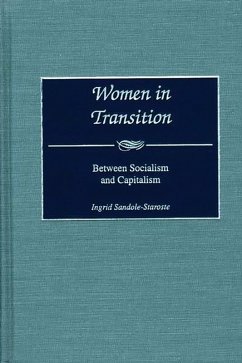As the transition from state socialism to capitalism takes place in various parts of the world, the everyday experiences of those individuals who are primarily affected by the drastic changes are often overlooked. Here, the authentic voices of 52 East German women who lived under state socialism and under the current reunified capitalist system are presented and examined in an effort to underscore the complexity of the transition on the most personal level. East German women, the author asserts, have had to shift their identities, expectations, and actions from accommodating one type of patriarchy to another, experiencing less gender equality in their everyday lives under capitalism than under state socialism. The author concludes that the women of East Germany, and possibly other post-communist states in general, are worse off, having regressed to fit into a more primitive form of patriarchy. At the end of the Cold War, East German women's private lives and emotional capacities took on vital public significance, as ruling elites expected women to make significant contributions to the political and economic stability of the reunited country. To accomplish this stability, the social roles and spaces of East German women had to be redefined to fit into the West German model. Through the voices of these women, the author shows that they fared better in some respects under the old socialist system and that they were now subjected to new, and much more traditional, gender roles even as they were expected to work and advance within the more patriarchal system. By presenting and analyzing the thoughts and perceptions of these women, the author illustrates how they have resisted, to various degrees, complying with the demands made by the newly established institutions, which require them to relinquish the crucial part of their identity that was shaped by socialist norms and values.
Bitte wählen Sie Ihr Anliegen aus.
Rechnungen
Retourenschein anfordern
Bestellstatus
Storno









